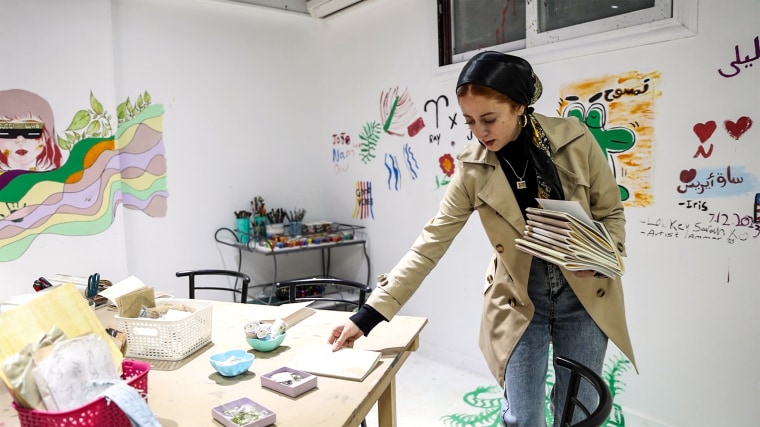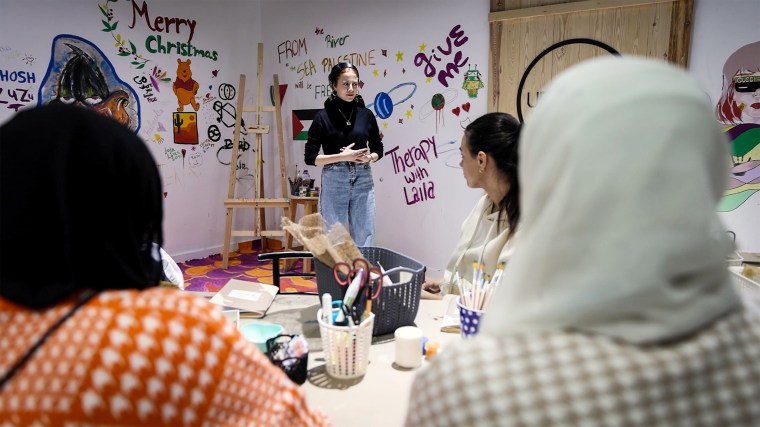Today, more than 90% of the enclave’s population has been driven from their homes.
In Cairo, Shurrab no longer lives in a danger zone, but she still finds it hard to distance herself from thoughts of the UNHCR tent because her parents, whom she’s desperately trying to get out, are still in Gaza.
“My family is still under the tent. I still can’t escape it,” she said. “And there’s part of me that feels the guilt that I have access to water, electricity, lights, bathrooms.”
‘The trauma is persisting’
While war’s toll on mental health has become more researched since PTSD — post traumatic stress disorder — was coined in the 1980s after veterans’ experiences from the Vietnam War, experts say that exposure to protracted and ongoing conflict poses distinct mental health challenges.
Scarred by ongoing violence, military occupation, land seizures, and restrictions on their movements, Palestinian youths and young adults — both in Gaza and the occupied West Bank — are especially vulnerable to significant mental trauma.
“It’s one of the places in the world with the highest rates of psychological distress,” Dr. Audrey McMahon, a psychiatrist for Doctors without Borders, said in a telephone interview from east Jerusalem.
Last year, an in-depth World Bank study found that 71% of the adult population in Gaza exhibited symptoms consistent with depression. In 2022, over half of Gazan children expressed suicide ideation, according to a Save the Children study. A further 80% of participants reported emotional distress.
“When you have a population of children that score so high for psychological distress and for depression. The question is not what’s wrong with these children? But what’s wrong with the context? Because this isn’t normal,” McMahon said, referring to the data and her mental health work visits in Gaza.

NBC News
Yara Asi, the author of “How War Kills: The Overlooked Threats to Our Health,” said many events in Gaza undoubtedly qualify as being “highly traumatic,” including witnessing mangled bodies and being displaced from one’s home. But when such experiences are coupled with a “lack of any conception of when this will end,” and no avenues for justice, it exacerbates the trauma, Asi added.
“We need to stop looking at trauma just as the event itself,” she said. “The trauma is persisting. If there’s no accountability, that in itself is continued trauma, even if the child lives and is resettled in Egypt.”
A 2020 study of pre-teen and teenage students in Gaza found more than half of participants fit the diagnosis criteria for PTSD.
But Dr. Samah Jabr, a longtime clinical psychiatrist who chairs mental health services at the Palestinian Health Ministry in Ramallah, said Western mental health diagnoses fail to encompass the impact of ongoing “oppression.”
“PTSD can better describe the experience of a soldier,” she said. “That’s not the situation of Palestinians; they are fought continuously in their homeland. So the Palestinian experience is colonial, historic, collective, cumulative and cross generational. There is no ‘P’ — there is no ‘post’ in our PTSD,” she added.
‘Traumas are not something to avoid’
Surviving seven wars in the last two decades, Shurrab knows these challenges well. It’s why she’s passionate about mental health and art therapy as a means to heal. Since arriving in Cairo, she’s hosted 10 journaling sessions attended by Palestinians who have fled the war, as well as Egyptians, and hopes to pursue studies in creative-driven therapy methods.
In recent years, journaling and expressive writing have become a more researched tool to alleviate mental health conditions such as PTSD, and build resilience amid persistent pain and loss.

Before she fled Gaza, Shurrab vowed to only fill her diary’s last page if she survived the war.
The page eventually featured anguished goodbyes and open-ended questions like “What will happen to my parents?” and “Where am I going?”
“Questions I don’t have answers to until now,” she said, reflecting on the last page of her Gaza journal.
But despite the layers of uncertainty coursing through her journal, Shurrab and her diary are resolutely hopeful.
“Traumas are not something to avoid,” she said, adding, “They are the stuff that build, make us fuller and make us more experienced and full of life.”











